Kraig Chiles — who Broke the Record To Become San Diego Sockers ALL TIME LEADING GOAL SCORER — on Becoming a Great Soccer Player
EXCLUSIVE INTERVIEW – Kraig Chiles #37 broke the historic San Diego Sockers’ all-time scoring record from 1991 — a great leader on and off the field, Chiles is also a Director of Coaching at a prominent youth soccer club in San Diego. A player known for his dedication and hard work, Chiles shares his advice for players who want to be their best.
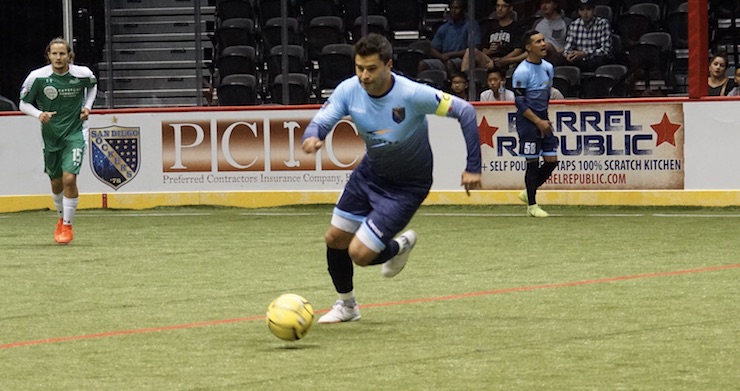
San Diego Sockers star forward Kraig Chiles became the All-Time Leading Goal Scorer in History as the Sockers prevailed against the Ontario Fury, 10-6. San Diego Sockers improve to 7-3, while Ontario Fury go to a 3-4 record. Scoring his 300th goal in a San Diego Sockers uniform, Chiles is an excellent example of great talent honed with hard work.
SoccerToday’s Diane Scavuzzo Interview with San Diego Sockers captain Kraig Chiles on what it takes to be successful as a soccer player and his role developing today’s youth soccer players.
Diane Scavuzzo: How long have you been playing for the Sockers?
Kraig Chiles: This is my 8th year playing with the San Diego Sockers.
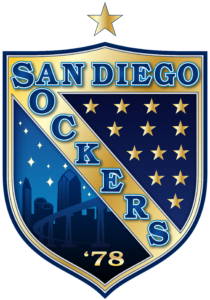 Diane Scavuzzo: What is it like to captain a professional soccer team?
Diane Scavuzzo: What is it like to captain a professional soccer team?
Kraig Chiles: It’s a unique experience. The first 5 or 6 years I was on the team, I played under Aaron Susi and Paul Wright — who are serious players and great leaders on and off the field. I learned a lot from them.
Diane Scavuzzo: What makes a soccer player great?
Kraig Chiles: Every player is different, but they all have to want to work hard. Having a good work rate is important because a lot of success comes from practice and repetition.
Soccer is a thinking person’s game.
Personally, I have a quick release on my shot and I catch a lot of goalies off guard — thinking that I’m going to go one way when I go another. My opponents think I am going to dribble when I actually release a shot.
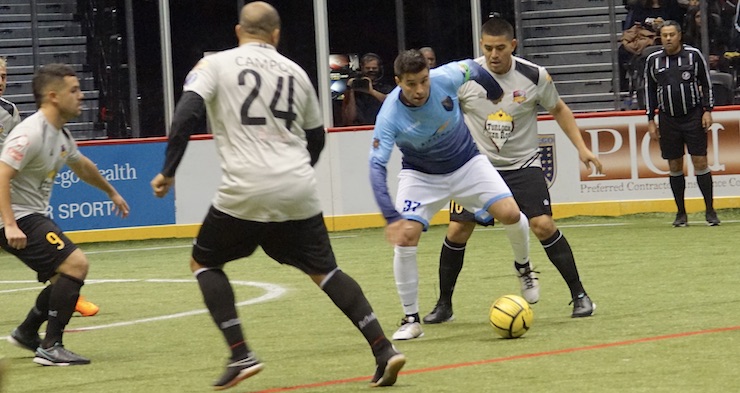
It is important to always keep moving, trying to create opportunities to make a play. I’m a real student of the game. Other players might rely on their athleticism. My advice is to watch professional players and how they move off the ball.
All my hard work just plays dividends now.
Diane Scavuzzo: You are the Director of Coaching for the Cardiff F.C. Mustangs — How many player do you have at the youth soccer club?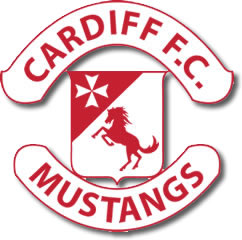
Kraig Chiles: Yes, I am at the Cardiff Mustangs which is a small club with both recreational and competitive youth soccer players — we have approximately 650 youth soccer players.
When I grew up playing soccer in San Diego, you played for your community club. If you were an elite boy, you played for the Nomads Soccer Club.
Now, the landscape has changed and there are many options. There are obviously the big fish — the larger youth soccer clubs, and then there are the community clubs — which have their fantastic teams.
At Cardiff, we’re trying to serve the local kids and give everyone an opportunity to play in front of a positive coach and role model.
Only a tiny percentage of youth soccer players are going to become professional players. They’re all going to be role models and citizens — possible future soccer fans.
We’re trying to build good people before we build a professional soccer player.
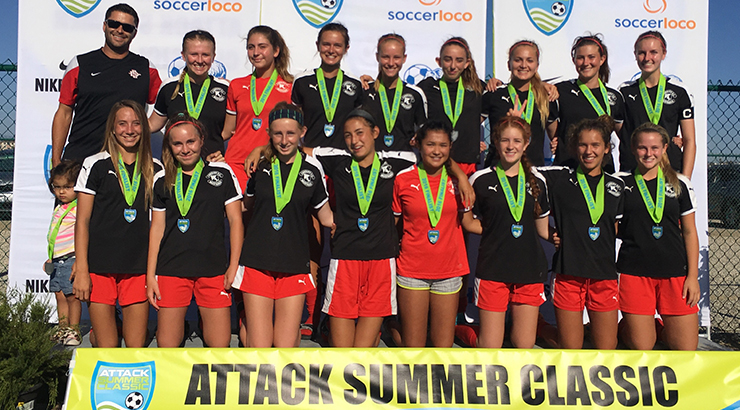
Diane Scavuzzo: What do you like most about the Cardiff Soccer Club and your role there?
Kraig Chiles: When I joined there were three competitive youth soccer teams. At Cardiff, I saw an opportunity to make a positive difference with a program that had facilities in a great location with no director. I thought, if I could add a couple good quality coaches and build off of this rec program, we could potentially have some real wonderful success.
The way I look at competitive soccer is, if the kids are happy — if they are getting better and, if the parents aren’t complaining and are coming back, it’s a success.
I don’t care if the teams win games. I care if the kids are happy and learning.
Diane Scavuzzo: Do you think some youth soccer coaches are too soft on players nowadays?
Kraig Chiles: For sure!
Of course, there are always coaches that are too soft and then there are coaches that are too hard or too negative.
I really believe it’s about finding the balance and working with the player pool that you have.
It’s a matter of finding what those players need and getting the best out of the age pool you have.
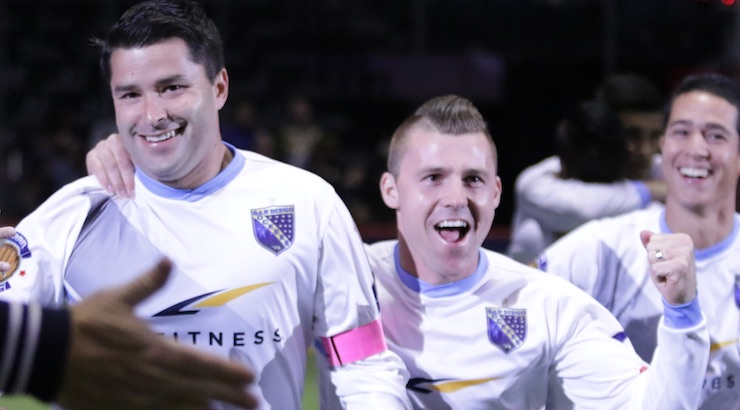
Diane Scavuzzo: How important is confidence as a youth player and as a professional?
Kraig Chiles: Confidence is huge for players of all ages — youth or professional.
Even as a pro who has scored 300 goals, my confidence sways week to week.
There are some weeks when I’m feeling fantastic and there are some weeks when I’m questioning what’s happening. It definitely affects your play.
Being successful on the field is a matter of being confident and assuring yourself that you are a good player — that you do bring something to the table. I think good coaching has a lot to do with a player’s confidence.
Sockers head coach Phil Salvagio has done nothing but help me and guide me in the right direction. He gives me praise when it’s deserved, and he will tell me when I’m not doing well. He’s given me the freedom offensively to do essentially whatever I want as long as I’m being productive and helping the team win.
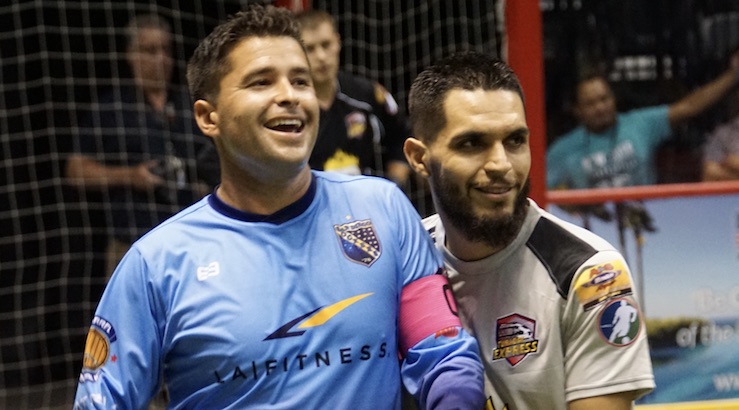
Diane Scavuzzo: You have a great relationship with San Diego Sockers coach Phil Salvagio, but have you ever played for a coach you did not like?
Kraig Chiles: Throughout my career I played for coaches that I did not like and I played for coaches that I absolutely adored.
I think when it’s said and done, I took the positives from the coaches that I’ve worked with — and, tried to limit the negative things that I didn’t like.
Diane Scavuzzo: What did you do when you had a coach that you didn’t like?
Kraig Chiles: For me, it’s important to fulfill the commitment to the team. I think in this day and age, there is very little loyalty in youth soccer. Or even in a lot of pro soccer.
If a players doesn’t like their coach for a specific reason, I think it’s important to move on when the time is right.
You have to understand that every coach isn’t going to be perfect for you. It’s a matter of trying to limit the negative impact on your game.
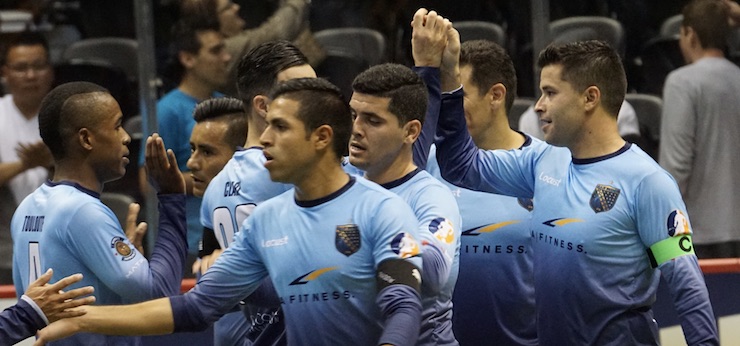
Diane Scavuzzo: Is it a hard life to be a professional soccer player?
Kraig Chiles: It’s not. It’s actually a really nice life.
I spend most of my mornings with my three children, which is fantastic. I wouldn’t want to change that. I have the opportunity to bring my kids to the game and into the locker room. That’s a unique experience.
Now, at this age, I’m really playing with the hope that I can play long enough for my kids to remember some of these moments.
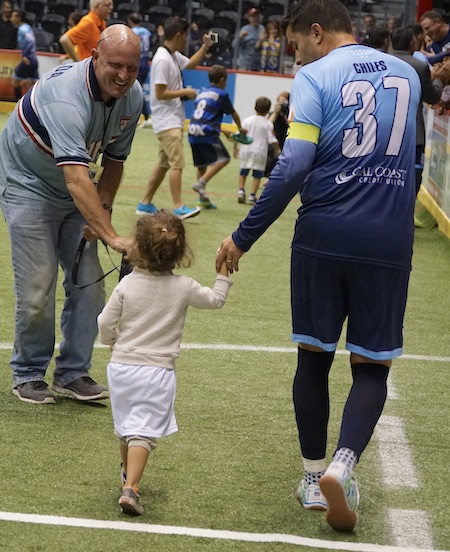
My daughter is two-and-a-half and my twin boys are one-and-a-half. So, hopefully that will be a little while. I have three years left in my contract.
Diane Scavuzzo: Could you imagine playing for another team?
Kraig Chiles: No, I wouldn’t play for another team. I would retire before I did and Phil knows that.
Diane Scavuzzo: What do you think the challenges are to winning the MASL championship? The Sockers have already won 14 championships – can they win another this year?
Kraig Chiles: I think defensively we’re going to have to be a little better than we are. Offensively, we’re doing better and we are going to get even better as we gel.
It’s a fairly new team. If the Sockers are really going to win the championship, we have to be able to put together a more consistent complete game. Thus far we’ve been fantastic in two or three quarters of every match and we’ve been extremely average or worse in a quarter. That’s not how you win the championship. We have to be good for a complete game and put together a solid four quarters to win at the highest level.
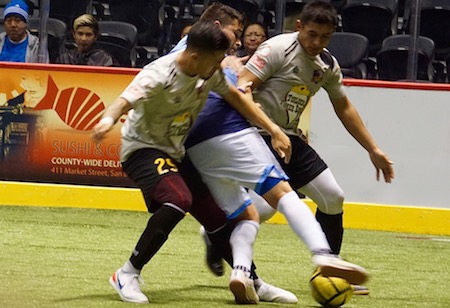 Diane Scavuzzo: What’s the problem in one of the quarters?
Diane Scavuzzo: What’s the problem in one of the quarters?
Kraig Chiles: It’s really hard to pinpoint. Looking at the game film will help us figure out what exactly is going wrong in order to get to the bottom of it.
Diane Scavuzzo: You are often seen after a Sockers’ game chatting with fans ….
Kraig Chiles: Yes, I enjoy it. I enjoy staying after the game to mingle with our fans and the youth soccer players who have come to the game. I know that it’s important to fans and I want to be approachable as a player. It’s something I take seriously and I try to show that to the rest of the team.
I really just try to lead by example — and do my best on and off the field to help mentor our younger team players by showing them there’s a responsibility being a San Diego Sockers — they’re a role model.
Related Article: Kraig Chiles Breaks the Sockers All Time Scoring Record; Kraig Chiles on SD Sockers’ #QuestFor15






